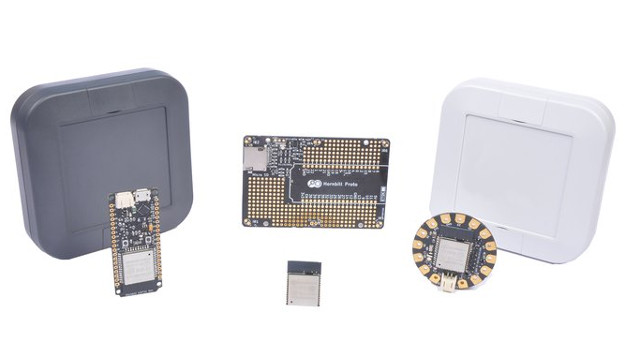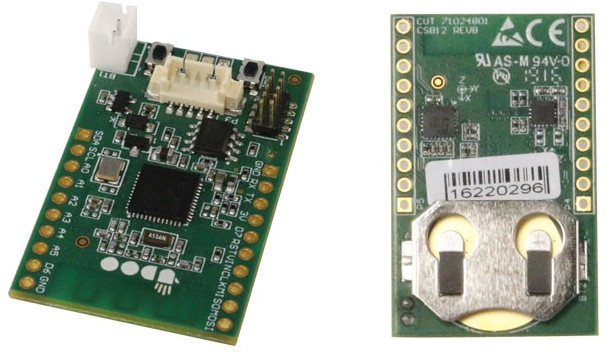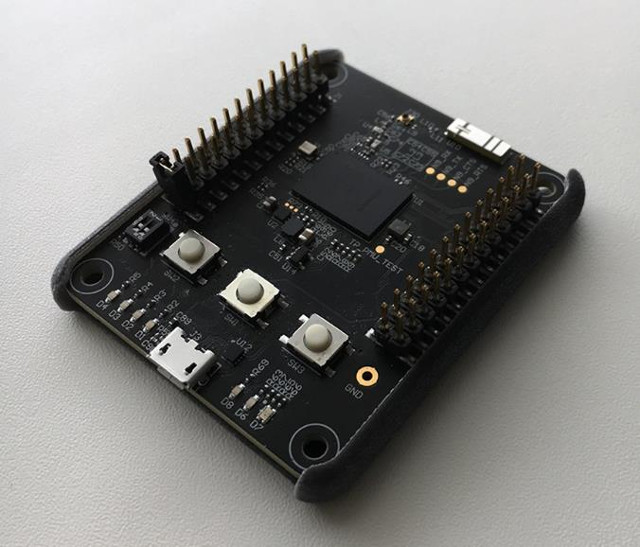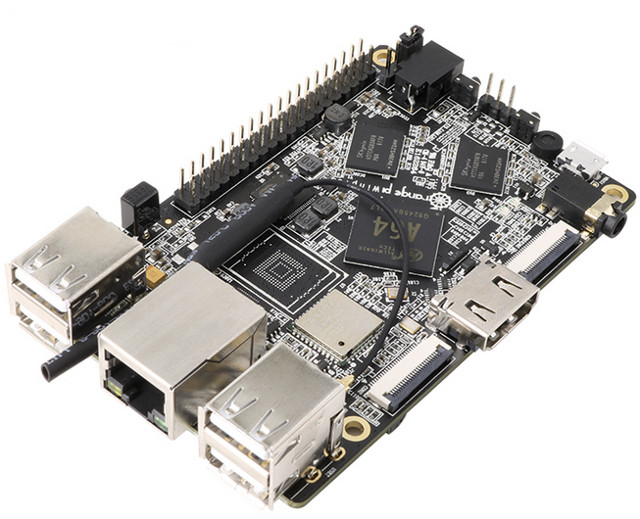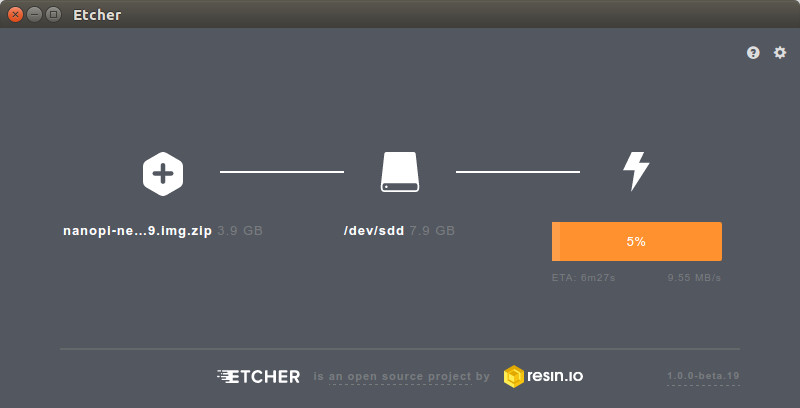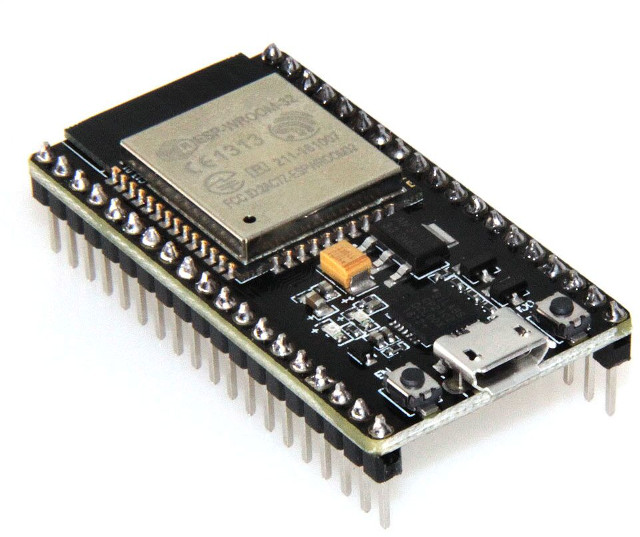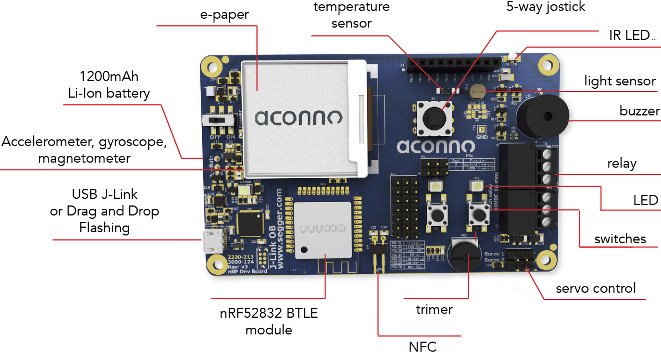While there are plenty of ESP32 development boards, and prices have recently plummeted, getting a case for your project can still be a problem especially if you plan to use it outdoor, as you need to protect your hardware from rain and dust. Hornbill project offers two ESP-WROOM-32 based boards, a prototype board, and an IP67 certified case that could be useful for outdoor use. Hornbill ESP32 Development Boards Let’s start by checking the boards available starting with ” Hornbill ESP32 Dev” board with the following specs: ESP-WROOM-32 module with WiFi, Bluetooth LE, FCC, CE, IC, MIC (Telec), KCC, and NCC certifications I/O headers 2x 19-pin headers with GPIOs, I2C, UART, SPI, ADC, DAC, touch interface, VN/VP, 5V, 3.3V and GND Breadboard-friendly Debug – Built-in CP21XX USB-to-serial Power Supply – 5V via micro USB port, battery header + single cell LiPo charger Dimensions – TBD ESP32 Minima is also based […]
UDOO BLU and BLU SENSE IoT Modules Integrate Bluetooth LE, Zigbee, and 6LOWPAN Connectivity
UDOO is known for their Linux boards based on NXP and Intel processors for makers and the education market such as UDOO NEO or UDOO x86, but the company has now developed UDOO BLU and BLU SENSE battery powered modules based on Texas Instruments CC2650 ARM Cortex M3 microcontroller, both with Bluetooth LE, Zigbee, and 6LOWPAN connectivity, and the SENSE model adds some extra sensors. UDOO BLU and BLU SENSE specifications: Wireless MCU – Texas Instruments CC2650 ARM Cortex M3 MCU @ 48 MHz with 128KB flash, 8KB SRAM with 2.4 GHz radio Connectivity – Bluetooth Low Energy (BLE), ZigBee, 6LoWPAN Sensors (BLU SENSE only) – NXP FX0S8700CQ accelerometer & magnetometer sensor, NXP FXAS21002C gyroscope & temperature sensor Expansion 1x 5-pin sensors Snap-In I2C connector for UDOO Bricks 2x 10-pin headers with 8x Digital GPIOs, 6x ADCs, 1x I2C, 1x SPI, 1x UART Misc – 3x User Configurable LEDs (Red, […]
Microsoft is Working with Mediatek on Project Sopris Secure WiFi MCU
There are serious security issues with the Internet of Things at all levels: hardware, software, network, and end-users. Microsoft Research NExT Operating Systems Technologies Group has been tasked with “exploring the goal of securing the vast number of low cost Internet connected devices coming online” with Project Sopris. They have shared their first technical report that identifies “seven properties of highly secure devices”, and describes their experiments towards designing microcontroller based prototype devices adapted from Mediatek MT7687 MIPS microcontroller, and exhibiting those seven properties. The seven properties identifies by Microsoft team include: Hardware-based Root of Trust – Unforgeable cryptographic keys generated and protected by hardware. Physical countermeasures resist side-channel attacks. Small Trusted Computing Base – Private keys stored in a hardware-protected vault, inaccessible to software. Division of software into self-protecting layers. Defense in Depth – Multiple mitigations applied against each threat. Countermeasures mitigate the consequences of a successful attack on […]
Shenzhen Xunlong Releases Two Orange Pi Boards with 64-Bit ARM Processor, 2GB RAM
Shenzhen Xunlong has already been selling 64-bit ARM development board with their Orange Pi PC 2 & Orange Pi Zero Plus 2 H5 boards based on Allwinner H5, as well as Orange Pi Win board powered by Allwinner A64 processor. However, so far none of them are equipped with much memory, with the only options being 512MB or 1GB RAM. The company has recently launched two new boards with 2GB RAM, namely Orange Pi Win Plus featuring Allwinner A64 SoC, and Orange Pi Prime equipped with Allwinner H5 SoC. Orange Pi Win Plus That board is just an update to Orange Pi Win board with the only difference I could find being the 2GB RAM: SoC – Allwinner A64 quad core ARM Cortex A53 processor @ 1.2 GHz with Mali-400MP2 GPU System Memory – 2GB DDR3 Storage – 2MB SPI flash, micro SD slot up to 64GB, footprint for optional […]
NanoPi NEO2 Board Benchmarks with Ubuntu 16.04.2 using Linux 3.10 and Linux 4.10
I’ve received NanoPi NEO 2 boards, add-boards and sensor modules last week, where we could see how small the boards were, and how it could be suitable for IoT projects or “hardware hacking” education. Before testing the board with the add-ons, I have to select the image to run on the board, and currently we have two choices: Ubuntu 16.04.2 FriendlyELEC image with Linux 3.10 “legacy” kernel, or Armbian Ubuntu 16.04.2 Xenial nightly build with Linux 4.10 “mainline” kernel. So I decided to try both: dfssf nanopi-neo2-ubuntu-core-qte-sd4g-20170329.img.zip (296 MB) is the image from FriendlyELEC (previously FriendlyARM) Armbian_5.27.170401_Nanopineo2_Ubuntu_xenial_dev_4.10.0.7z (222 Mb) is the image from Armbian, which I downloaded on March 31st despite the filename including “170401” string You can flash the image with Win32DiskImager (Windows) or dd (linux) to a micro SD card the usual way, and while I’ve never personally had troubles with dd, I’ve been told Etcher was better, […]
Is NodeMCU ESP-32S Board Now Selling for $8.50 Shipped?
ESP32 SoC with WiFi and Bluetooth launched last September for around $3, followed soon after by ESP32 modules for $7, and a few weeks later, easier to use ESP32 development boards were introduced, but sold for around $20 likely due a mismatch between supply and demand. That’s not overly expensive, but in a world of $4 ESP8266 boards and $10 Raspberry Pi Zero W with Linux, WiFi and Bluetooth, it may feel that way. But today, I noticed DealExtreme sold GeekWorm ESP32 board with ESP-WROOM-32 module for just $11.64 shipped. That’s good progress, but surely Aliexpress must now have cheaper options, and sure enough, I could find NodeMCU ESP-32S board (now confirmed NOT to be an official NodeMCU devkit) sold for $6.95 + shipping, which brought the price up to about $8.50. NodeMCU ESP-32S specifications: Wireless Module – ESP-WROOM-32 with Espressig ESP32 dual core processor with 802.11 b/g/n WiFi and […]
MQMaker Koala is a Features-Packed Development Board Powered by Rockchip RK3288 Processor
MQMaker launched MiQi board based on Rockchip RK3288 quad core Cortex A17 processor last year with the hardware aimed at hobbyists and makers, but the company has been developing a higher-end board – named Koala – based on the same processor, featuring many more ports and features, and geared towards the enterprise market. Koala board preliminary specifications: SoC – Rockchip 3288 quad core ARM Cortex A17 up to 1.8 GHz with Mali-T764 GPU supporting OpenGL ES 1.1/2.0 /3.0, and OpenCL 1.1 System Memory – 2GB DDR3 (default) Storage – 16 GB eMMC flash (default) + micro SD slot Video Output / Display Interface – HDMI 2.0, header for eDP, MIPI, LVDS, LCD backlight header, touch panel header Audio – HDMI out, optical S/PDIF, 3.5mm analog stereo audio jack, microphone header, audio L/R header Connectivity – Gigabit Ethernet, WiFi or WiFi + Bluetooth module, mini PCIe slot for 3G/4G card + SIM card slot USB – 4x […]
Aconno Bluetooth 4.0 & 5 IoT Development Board Features an nRF52832 or nRF52840 Module, an e-Paper Display, Sensors and More
Bluetooth 5 is the latest iteration of Bluetooth with up to four times the speed and twice the range of Bluetooth 4.0 LE, and so far apart from Puck.js and Nordic Semi nRF52840 devkit, I had not seen many Bluetooth 5 IoT modules or boards. Aconno, a German startup, has designed ACD-52832 Bluetooth 4.0 / Thread / ANT+ IoT development board based on their own nRF52832 module, and equipped with some goodies like a black & white e-Paper display, a joystick, sensors, I/Os, etc… They’ve also launched an updated module with Bluetooth 5 using nFR52840 SoC. I don’t have the full details about the new module, but the nRF52832 module and devkit is interesting to look at, especially features should be similar. Aconno ACD-52832 board specifications: Wireless Module – ACN52832 based on Nordic Semi nRF52832 ARM Cortex-M4 @ 64 MHz SoC with Bluetooth Smart, ANT+, Thread, NFC, and 2.4 GHz […]


